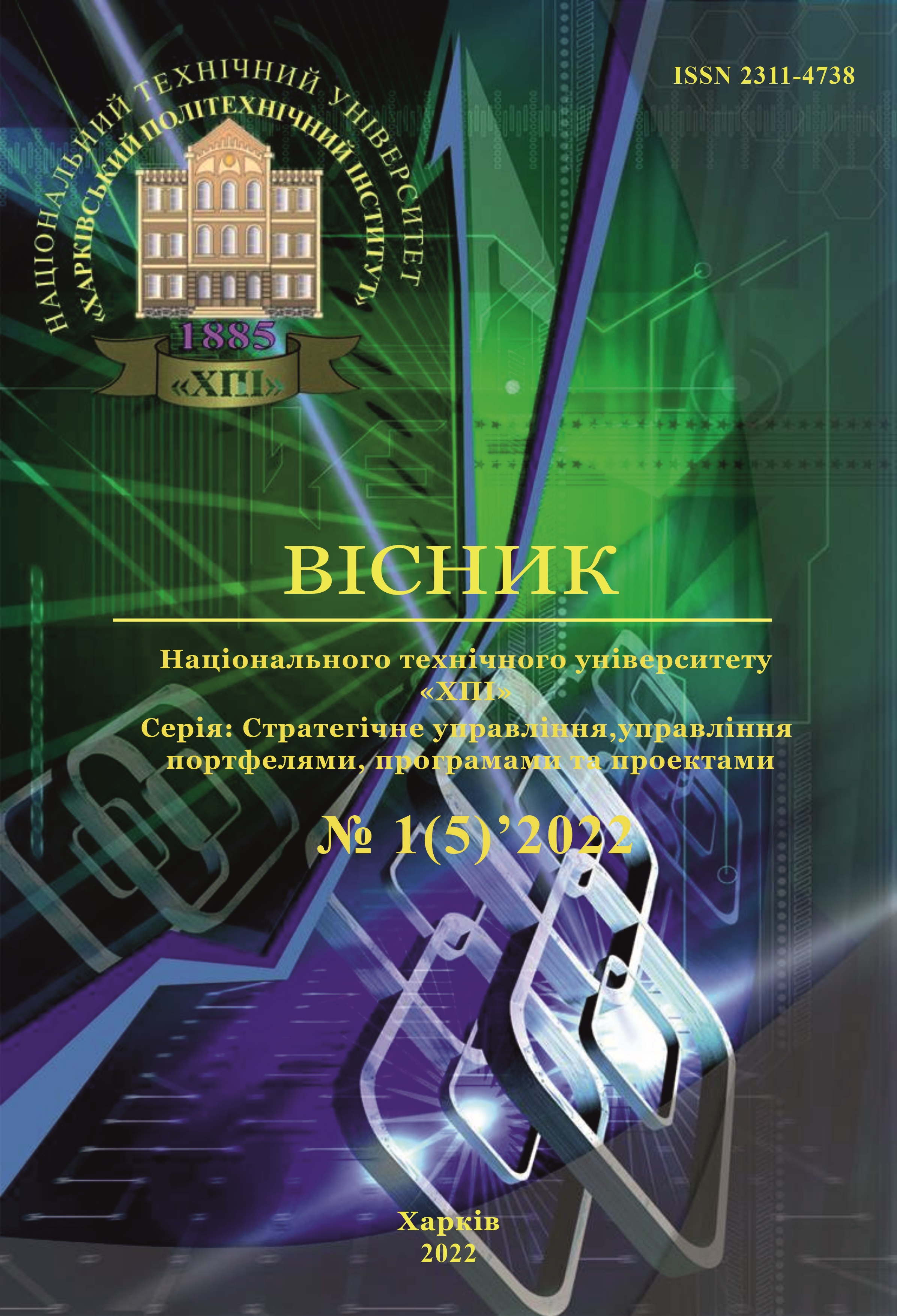СONFLICTS IN PROJECT MANAGEMENT
DOI:
https://doi.org/10.20998/2413-3000.2022.5.6Keywords:
conflict; project team; joint activities; sources of conflict; corporate culture; conflict personalities; project manager; behavioral competencies; conflict managementAbstract
It is shown that in the case of people carrying out joint activities, including in the practice of using project management technology, conflicts may arise between performers and different groups of performers. They, as a rule, are due to differences in goals and motives, aspirations and interests of people, their psychological characteristics. Conflicts are undesirable, since they significantly complicate the interaction and relationships between the performers and, accordingly, prevent the achievement of the desired or expected results of joint activities in the implementation of project tasks. The nature and possible causes of the conflict and its types are analyzed. In particular, it has been found that not every difference causes conflicts. Their sources are basically only those situations in which the material interests of at least one of the parties, their dignity or social status are affected. This indicates the importance of taking into account in the practice of project management not only technological, but also psychological aspects of activity. The nature of the interaction between the level of cohesion, psychological compatibility and corporate culture of the project team and the impact of possible conflicts on it and on the relationship between members of the project team. It is shown that the likelihood of conflict increases significantly when the project team includes so-called conflicting personalities. The meaning and nature of the project manager's activity, aimed at preventing conflicts, as a manifestation of one of his important behavioral competencies, is revealed. Examples of the content and nature of the model of adequate behavior of a leader in a conflict, as well as behavior requiring correction, are given. The article considers the essence of the conflictological competence of the project manager, which includes the manager's knowledge and understanding of his possible violations that can lead to conflict situations and conflicts. Effective ways of preventing and managing conflicts in case of their occurrence are considered.
References
Бабаєв В.М. Управління проектами: Навчальний посібник. Харків: ХНАМГ, 2006. 244 с.
Багратиони К. А. Психологический подход к конфликтменеджменту проектов: типология, причины, управление (часть 1). Управление проектами и программами. 2011. №3. С. 212–221.
Бушуев С. Д., Бушуева Н. С. Управление проектами: основы профессиональных знаний и система оценки компетентности проектных менеджеров (National Competence Baseline, NCB UA Version 3.1). [2-е изд.]. К.: ІРІДІУМ, 2010. 208 с.
Данченко О. Б., Бедрій Д. І., Семко І. Б. Управління конфліктами наукового проекту. Вісник Національного технічного університету «ХПІ». Серія: Стратегічне управління, управління портфелями, програмами та проектами. 2019. № 2 (1327). С. 28-35.
Кононенко И. В., Колесник М. Э. Оптимизация содержания проекта по критериям прибыль, время, стоимость, качество, риски. Восточно-Европейский журнал передовых технологий. 2012. №1/10 (55). С. 13–15.
Новікова, Н. Управління конфліктами в організації: підходи до вирішення та профілактики. Галицький економічний вісник. 2013. № 2 (41). С.7983
Романовський О. Г., Пономарьов О. С., Підбуцька Н. В. Конфліктне спілкування в інженерній діяльності: навчальний посібник. Харків: НТУ «ХПІ», 2014. 293 с.
Шерстюк, О. И., Колесников А. Е. Использование метода ранжирования при формировании необходимого набора компетенций команды проекта. Вісник НТУ «ХПІ». Серія: Стратегічне управління, управління портфелями, програмами та проектами. Харків : НТУ «ХПІ», 2018. № 2 (1278). С. 3137.
Kariuki Muigua. Dealing with Conflicts in Project Management. Chartered Institute of Arbitrators (Kenya), Alternative Dispute Resolution. 2018; 6(2): P. 1-36.
Lloyd S.R. Conflict resolution: steering clear of the drama triangle. Rural Telecommunication, 2001. (20:5). рp. 30-34.
Ohlendorf A. Conflict Resolution in Project Management: 2001.
Deepak Kumar Nunkoo, Roopesh Kevin Sungkurю. Team conflict dynamics & conflict management: derivation of a model for software organisations to enhance team performance and software quality. Global Transitions Proceedings. 2 (2021) рр. 545–552.
Amin Akhavan Tabassiac, David JamesBrydeb, Aldrin Abdullaha, Maria Argyropoulouc. Conflict Management Style of Team Leaders in Multi-Cultural Work Environment in the Construction Industry. Procedia Computer Science. Volume 121, 2017, рр. 41-46.
A.P. Correia Dealing with conflict in learning teams immersed in technology-rich environments: A mixed-methods study. Education and Information Technologies (2019), pp. 1-23,
Sudhakar, G. P. (2015). A review of conflict management techniques in projects. Brazilian Journal of Operations & Production Management, 12(2), рр. 214–232.
Grinchenko М., Ponomaryov O., Lobach O. Leadership as factor for building a project team. Сучасний стан наукових досліджень та технологій в промисловості. 2018. № 1 (3). – С. 13-21. DOI: https://doi.org/10.30837/2522-9818.2018.3.013
Гринченко М. А., Пономарьов О. С., Лобач О. В. Лідерство в системі поведінкових компетенцій фахівця з управління проектами. Вісник Національного технічного університету «ХПІ». Серія: Стратегічне управління, управління портфелями, програмами та проектами. 2018. № 2 (1278). С. 81-87. DOI: 10.20998/2413-3000.2018.1278.12
Гринченко М. А., Пономарьов О. С., Лобач О. В. Надежность как характеристика проектной команды. Сучасний стан наукових досліджень та технологій в промисловості. 2018. № 4 (6). С. 154-160. DOI: https://doi.org/10.30837/2522-9818.2018.6.154
Downloads
Published
Issue
Section
License

This work is licensed under a Creative Commons Attribution-NonCommercial-ShareAlike 4.0 International License.
Our journal abides by the Creative Commons copyright rights and permissions for open access journals.
Authors who publish with this journal agree to the following terms:
Authors hold the copyright without restrictions and grant the journal right of first publication with the work simultaneously licensed under a Creative Commons Attribution-NonCommercial-ShareAlike 4.0 International License (CC BY-NC-SA 4.0) that allows others to share the work with an acknowledgement of the work's authorship and initial publication in this journal.
Authors are able to enter into separate, additional contractual arrangements for the non-commercial and non-exclusive distribution of the journal's published version of the work (e.g., post it to an institutional repository or publish it in a book), with an acknowledgement of its initial publication in this journal.
Authors are permitted and encouraged to post their published work online (e.g., in institutional repositories or on their website) as it can lead to productive exchanges, as well as earlier and greater citation of published work.

